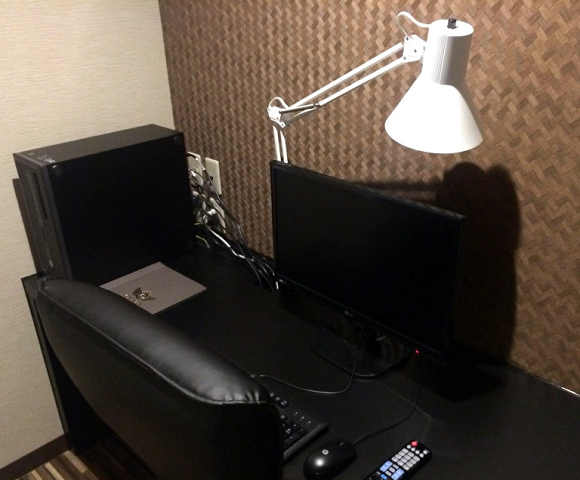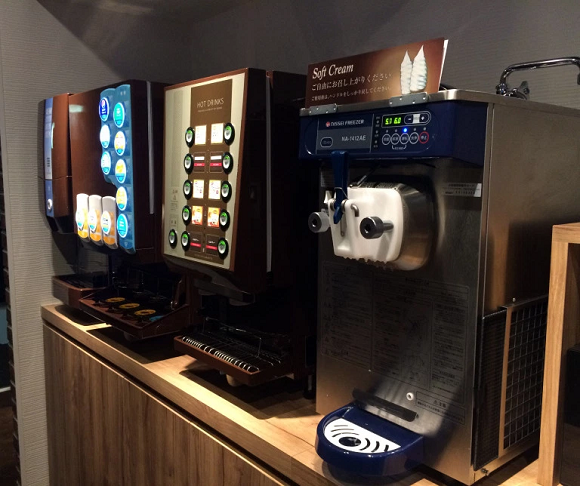
Not having enough money to pay rent each month isn’t their biggest problem is securing permanent housing, though.
In Tokyo, the trains stop running a little after midnight, but that doesn’t mean you have to go home. A number of businesses are happy to let paying customers hang out until morning comes, such as internet cafes, manga cafes, video viewing rooms, saunas, and capsule hotels.
These “all-night businesses” are a convenient option for partiers who’ve missed the last train. They’re less expensive than a taxi ride home or a room in a conventional hotel, and while they’re not as cheap as loitering in a 24-hour fast food joint, the staff won’t kick you out for sleeping. But a study done by housing assistance organization Tokyo Challenge Net reveals that not everyone who’s spending the night in a manga cafe is there because they were having too much fun to get to the station before the last train pulled out.
Tokyo Challenge Net collected data from a total of 222 all-night businesses (156 Internet/manga cafes, three “Internet rooms,” 24 video rooms, and 39 capsule hotels or saunas) over a three-month period starting in November 2016, and has recently released the results of its analysis. Through interviews and phone conversations, researchers found 946 people who were spending the night in one of these all-night businesses, and from the total number of such businesses in the city, calculates that on any given weekday night in Tokyo some 15,300 people are sleeping in an all-night business.
The most commonly given reason was “as part of travel of a business trip,” which was the response from 37.1 percent of respondents. Coming in second, though, at an alarming 25.8 percent, was “I don’t have a home.”
353 of the survey respondents said they have either lost their home or fear losing it, with roughly 90 percent of this group staying in all-night businesses at least three times a week. People in their 30s made up the largest chunk of this group, 38.6 percent, with another 28.9 percent being between 50 and 59 years old. Young adults in their 20s, meanwhile, accounted for less than 15 percent of those homeless or in danger of becoming homeless. Roughly half (46.8 ercent) said their monthly income was between 110,000 and 150,000 yen (US$980-US$1,340), with another 10.7 percent saying they had no income at all.
▼ The fact that many Internet cafes provide free self-serve soft drinks, and sometimes soup or even ice cream, is also probably an attractive point to those who need to stretch every yen.
Even with this dire financial background, though, the most commonly cited problem wasn’t not being able to afford rent. Instead, it’s the hefty upfront fees that renters have to pay in Japan before moving into an apartment, including security deposits, advance rent, and the dreaded gratuity to the landlord known as “key money,” that was the major hurdle, with 62.8 percent saying they can’t afford it. Next on the list was not being able to handle monthly rent payments (33.3 percent), followed by not having anyone to act as guarantor/cosigner on the lease (30.9 percent). Faced with such difficulties, a night in a an Internet cafe, which can cost as little as 1,000 yen for a five-hour stay, is an attractive quick-fix.
It should be noted that while Japan doesn’t have anywhere near the number of homeless shelters as similarly developed countries (which is part of the reason why homeless encampments can often be seen in certain Tokyo parks), the country does have organizations, such as Tokyo Challenge Net, which are doing what they can to help those in need of assistance. And though the study’s data was collected over a year ago, there haven’t been any significant changes to Japan’s economic fortunes or social welfare programs since the survey was conducted, and so it’s likely there are still just as many people staying in all-night businesses because they have nowhere else to sleep.
Related: Tokyo Challenge Net
Source: IT Media, Tokyo Metropolitan Government
Images ©SoraNews24


 Government study finds only 3,065 homeless people in Japan
Government study finds only 3,065 homeless people in Japan How much money do you need to live in your own apartment in Japan?【Survey】
How much money do you need to live in your own apartment in Japan?【Survey】 Japanese Twitter in an uproar about Tokyo ward that banned homeless from evacuation shelters
Japanese Twitter in an uproar about Tokyo ward that banned homeless from evacuation shelters Live with parents or burn through your savings? Survey of young anime workers draws bleak picture
Live with parents or burn through your savings? Survey of young anime workers draws bleak picture Tokyo’s famous capsule apartments now take month-long reservations from foreign travelers
Tokyo’s famous capsule apartments now take month-long reservations from foreign travelers Japan’s new difficult-to-drink-from beer glass protects your liver, but it’s a brutal experience
Japan’s new difficult-to-drink-from beer glass protects your liver, but it’s a brutal experience Demon Slayer: Kimetsu no Yaiba gets new roller coaster attractions and food at Universal Studios Japan
Demon Slayer: Kimetsu no Yaiba gets new roller coaster attractions and food at Universal Studios Japan How to order snacks on a Shinkansen bullet train in Japan
How to order snacks on a Shinkansen bullet train in Japan New samurai glasses are Japan’s latest weird must-have souvenir
New samurai glasses are Japan’s latest weird must-have souvenir Hello, cosmetics! Clinique teams up with Hello Kitty this summer for first-time collaboration
Hello, cosmetics! Clinique teams up with Hello Kitty this summer for first-time collaboration High-fashion Totoro cuddle purse is like an elegant stroll in the forest【Photos】
High-fashion Totoro cuddle purse is like an elegant stroll in the forest【Photos】 Burger King Japan suddenly adds Dr. Pepper and Dr. Pepper floats to its menu nationwide
Burger King Japan suddenly adds Dr. Pepper and Dr. Pepper floats to its menu nationwide New Nintendo Lego kit is a beautiful piece of moving pixel art of Mario and Yoshi【Photos】
New Nintendo Lego kit is a beautiful piece of moving pixel art of Mario and Yoshi【Photos】 Japan’s cooling body wipe sheets want to help you beat the heat, but which work and which don’t?
Japan’s cooling body wipe sheets want to help you beat the heat, but which work and which don’t? Nintendo history you can feel – Super NES, N64, and GameCube controllers become capsule toys
Nintendo history you can feel – Super NES, N64, and GameCube controllers become capsule toys “The most Delicious Cup Noodle in history” – Japan’s French Cup Noodle wins our heart【Taste test】
“The most Delicious Cup Noodle in history” – Japan’s French Cup Noodle wins our heart【Taste test】 Starbucks releases a cute Frappuccino and Unicorn Cake…but not in Japan
Starbucks releases a cute Frappuccino and Unicorn Cake…but not in Japan Kyoto Tower mascot termination reveals dark side behind cute Japanese characters
Kyoto Tower mascot termination reveals dark side behind cute Japanese characters McDonald’s Japan’s Soft Twist Tower: A phantom ice cream only sold at select branches
McDonald’s Japan’s Soft Twist Tower: A phantom ice cream only sold at select branches Yabai Ramen: What makes this Japanese ramen so dangerous?
Yabai Ramen: What makes this Japanese ramen so dangerous? Finally! Nintendo Japan expands Switch 8-bit controller sales to everybody, Online member or not
Finally! Nintendo Japan expands Switch 8-bit controller sales to everybody, Online member or not Japanese government wants to build luxury resorts in all national parks for foreign tourists
Japanese government wants to build luxury resorts in all national parks for foreign tourists To combat declining birth rate, Japan to begin offering “Breeding Visas” to foreigners
To combat declining birth rate, Japan to begin offering “Breeding Visas” to foreigners 10 things you should buy at 7-Eleven in Japan
10 things you should buy at 7-Eleven in Japan Studio Ghibli releases anime heroine cosplay dresses that are super comfy to wear
Studio Ghibli releases anime heroine cosplay dresses that are super comfy to wear Woman charged for driving suitcase without a license in Osaka
Woman charged for driving suitcase without a license in Osaka Studio Ghibli unveils My Neighbour Totoro miniature house model
Studio Ghibli unveils My Neighbour Totoro miniature house model Kyoto experiencing problems with foreign tourists not paying for bus fares, but not on purpose
Kyoto experiencing problems with foreign tourists not paying for bus fares, but not on purpose Fighting mild hunger with a Japanese soda that turns into jelly in the stomach【Taste test】
Fighting mild hunger with a Japanese soda that turns into jelly in the stomach【Taste test】 Studio Ghibli’s Howl’s Moving Castle tapestry unveiled in Japan for first time
Studio Ghibli’s Howl’s Moving Castle tapestry unveiled in Japan for first time McDonald’s new Happy Meals offer up cute and practical Sanrio lifestyle goods
McDonald’s new Happy Meals offer up cute and practical Sanrio lifestyle goods Sales of Japan’s most convenient train ticket/shopping payment cards suspended indefinitely
Sales of Japan’s most convenient train ticket/shopping payment cards suspended indefinitely Sold-out Studio Ghibli desktop humidifiers are back so Totoro can help you through the dry season
Sold-out Studio Ghibli desktop humidifiers are back so Totoro can help you through the dry season Japanese government to make first change to romanization spelling rules since the 1950s
Japanese government to make first change to romanization spelling rules since the 1950s Foreigner’s request for help in Tokyo makes us sad for the state of society
Foreigner’s request for help in Tokyo makes us sad for the state of society Ghibli founders Toshio Suzuki and Hayao Miyazaki contribute to Japanese whisky Totoro label design
Ghibli founders Toshio Suzuki and Hayao Miyazaki contribute to Japanese whisky Totoro label design Doraemon found buried at sea as scene from 1993 anime becomes real life【Photos】
Doraemon found buried at sea as scene from 1993 anime becomes real life【Photos】 Tokyo’s most famous Starbucks is closed
Tokyo’s most famous Starbucks is closed Princesses, fruits, and blacksmiths: Study reveals the 30 most unusual family names in Japan
Princesses, fruits, and blacksmiths: Study reveals the 30 most unusual family names in Japan What to do if you want to lower your apartment rent or avoid paying key money in Japan
What to do if you want to lower your apartment rent or avoid paying key money in Japan Japanese Internet cafe chain evolves into Internet hotel great for backpackers, budget travelers
Japanese Internet cafe chain evolves into Internet hotel great for backpackers, budget travelers Over 50 percent of single Japanese women in their 20s struggle to make ends meet, survey says
Over 50 percent of single Japanese women in their 20s struggle to make ends meet, survey says Survey reveals surprising age trend among paid subscribers of electronic comics in Japan
Survey reveals surprising age trend among paid subscribers of electronic comics in Japan Halloween vandals trash Tokyo ramen restaurant’s meal ticket machine, prompting ultimatum【Video】
Halloween vandals trash Tokyo ramen restaurant’s meal ticket machine, prompting ultimatum【Video】 We book a night in a bookshelf at Book and Bed in Shinjuku
We book a night in a bookshelf at Book and Bed in Shinjuku Is this Japanese train crowded? Question divides the nation
Is this Japanese train crowded? Question divides the nation Does a guy lose all chance with a Japanese woman if he doesn’t pay for the first date?【Survey】
Does a guy lose all chance with a Japanese woman if he doesn’t pay for the first date?【Survey】 Is this cheap, US$20-a-night capsule hotel in Tokyo’s Kabukicho a good-value stay?
Is this cheap, US$20-a-night capsule hotel in Tokyo’s Kabukicho a good-value stay? Top 10 areas in Japan’s capital region where women who live on their own want to live
Top 10 areas in Japan’s capital region where women who live on their own want to live Asakusa’s Sensoji temple shocks store owners with sudden 16-fold rent increase in shopping arcade
Asakusa’s Sensoji temple shocks store owners with sudden 16-fold rent increase in shopping arcade Tokyo realtor will give you hundreds of dollars of anime decorations for your new apartment
Tokyo realtor will give you hundreds of dollars of anime decorations for your new apartment Survey shows how Japanese couples feel about spending so much time together sheltering in place
Survey shows how Japanese couples feel about spending so much time together sheltering in place What’s the best way to eat Japanese cream stew and rice, “together” or “separate?”【Survey】
What’s the best way to eat Japanese cream stew and rice, “together” or “separate?”【Survey】 Tear-jerking Thai commercial is about stabbing of a homeless man – Can you guess what it’s for?
Tear-jerking Thai commercial is about stabbing of a homeless man – Can you guess what it’s for?
Leave a Reply